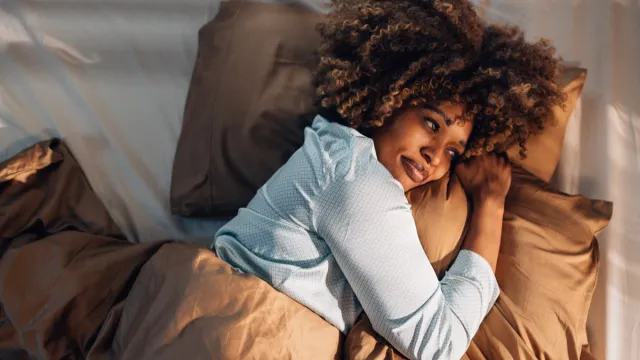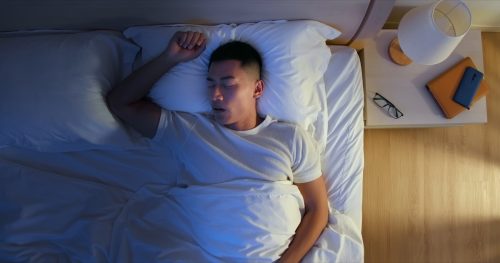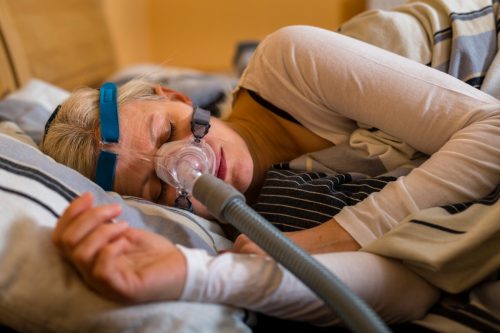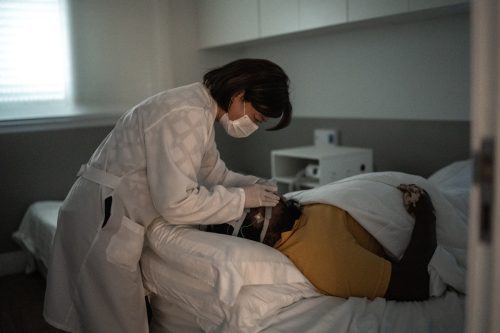I’m a Sleep Doctor and This Is the No. 1 Red Flag I Watch For

A good night of rest will have you waking up rejuvenated and ready for the day ahead. But on the flip side, bedtime troubles can make you miserable—and there are more long-term concerns to consider. Sleep plays a vital role in our health, supporting the way our body and brain function. To help make sure you’re sleeping how you should be, we talked to the experts to find out what you need to be looking out for at night. Read on to discover what sleep doctors call a major red flag.
RELATED: New Study Reveals the Best Bedroom Temperature for Perfect Sleep.
You need to watch out for disruptive snoring.

Snoring is an extremely common sleep habit. In fact, as many as 90 million people in the U.S. have reported snoring at some point in their lives, while 37 million say they snore regularly, according to Yale Medicine. But how you snore is critical when it comes to potential long-term health consequences.
“If you are routinely experiencing disruptive snoring, it’s important to speak with your doctor or a sleep specialist,” Shelby Harris, PhD, sleep doctor and director of sleep health at Sleepopolis, says.
Disruptive snoring can look like “sudden gasping or choking episodes during sleep,” according to Harris. But Cameron Heinz, MD, sleep doctor and health expert working for Mobility Nest, says it can also look like “intense and frequent snoring, accompanied by pauses in breathing.”
RELATED: 5 Subtle Signs You Aren’t Getting Enough Sleep, Doctors Say.
Doctors say this is a red flag for sleep apnea.

For some people, snoring is harmless, even if not to their partners. But disruptive snoring can be a major red flag for a dangerous sleep disorder.
“This is a classic symptom of sleep apnea, where breathing momentarily stops, leading to significant disruptions in sleep quality,” Naheed Ali, MD, sleep doctor and lead writer for Sleep Bubble, tells Best Life. “It’s not just about loud snoring; it’s about the pattern and the choking sounds that might follow.”
Sleep apnea is a “potentially serious sleep disorder in which breathing repeatedly stops and starts,” according to the Mayo Clinic. There are three main types: obstructive sleep apnea (OSA), central sleep apnea (CSA), and treatment-emergent central sleep apnea.
OSA occurs when throat muscles relax and block the flow of air into the lungs, while CSA occurs when the brain doesn’t send the right signals to the muscles that control breathing. Treatment-emergent central sleep apnea, also known as complex sleep apnea, is what happens when someone has OSA that becomes CSA while they are receiving treatment for OSA.
It is believed that this condition is under-diagnosed.

Doctors stress the importance of watching out for disruptive sleeping, because most people who have sleep apnea don’t know it. According to the American Medical Association (AMA), it is believed that about 30 million people in the U.S. have sleep apnea, but only six million are actually diagnosed with the disorder.
Globally, The Lancet Respiratory Medicine reported in 2019 that OSA (the most common type of sleep apnea) is estimated to affect 936 million adults aged 30 to 69 in a mild to severe manner—with the U.S. being the second-highest country in terms of affected individuals after China.
“The figure of nearly a billion adults with mild to severe OSA suggests that the condition is both under-diagnosed and under-recognized,” researchers wrote in a follow-up editorial accompanying the report.
RELATED: 6 Reasons You Feel Tired But Can’t Fall Asleep, According to Doctors.
Sleep apnea can lead to many different health problems.

Sleep apnea has complications beyond just being tired. In fact, your entire health may be at risk: Several studies have shown an association between sleep apnea and problems like type 2 diabetes, stroke, heart attack, and even a shortened lifespan, according to the Johns Hopkins Sleep Disorders Center.
“Snoring is sleep apnea’s calling card and snoring is your body’s way of crying for help. Now, not everyone who snores has sleep apnea, but almost everyone that has sleep apnea snores,” Madan Kandula, MD, founder and CEO of the Advent medical practice, tells Best Life. “Undiagnosed, this condition leads to a long list of downstream health issues: high blood pressure, anxiety, cardiac arrest, stroke, erectile dysfunction, asthma, dementia and depression to name a few.”
There are other signs you should watch out for.

Relying on using disruptive snoring as your one sign of sleep apnea is “tricky,” according to Kandula. After all, unless you have someone else who is observing you snore at night, you might never know. This is why experts advise watching out for other symptoms that are associated with sleep disorders like OSA.
“Excessive sleepiness during the day or fatigue despite getting an adequate amount of sleep, as well as irritability, poor concentration, energy loss are all red flags, too,” Kandula shares. “Additionally, daytime fatigue contributes to one of the most chilling effects of ongoing sleep disruption: drowsy driving. Sleep disorders have a direct effect on daytime tasks, especially those that involve getting behind the wheel of a car.”
Michael J. Breus, PhD, founder of The Sleep Doctor, says you should take note of situations you might face from sleep apnea, such as falling asleep at work or at stop lights, or needing alcohol just to fall asleep. If you notice any of these issues, you should “contact your doctor and ask to be referred to a sleep specialist,” he advises.
For more wellness advice delivered straight to your inbox, sign up for our daily newsletter.
Best Life offers the most up-to-date information from top experts, new research, and health agencies, but our content is not meant to be a substitute for professional guidance. When it comes to the medication you’re taking or any other health questions you have, always consult your healthcare provider directly.
- Source: https://www.mayoclinic.org/diseases-conditions/sleep-apnea/symptoms-causes/syc-20377631
- Source: https://www.ama-assn.org/delivering-care/public-health/what-doctors-wish-patients-knew-about-sleep-apnea
- Source: https://www.thelancet.com/journals/lanres/article/PIIS2213-2600(19)30198-5/fulltext
- Source: https://www.hopkinsmedicine.org/health/wellness-and-prevention/the-dangers-of-uncontrolled-sleep-apnea